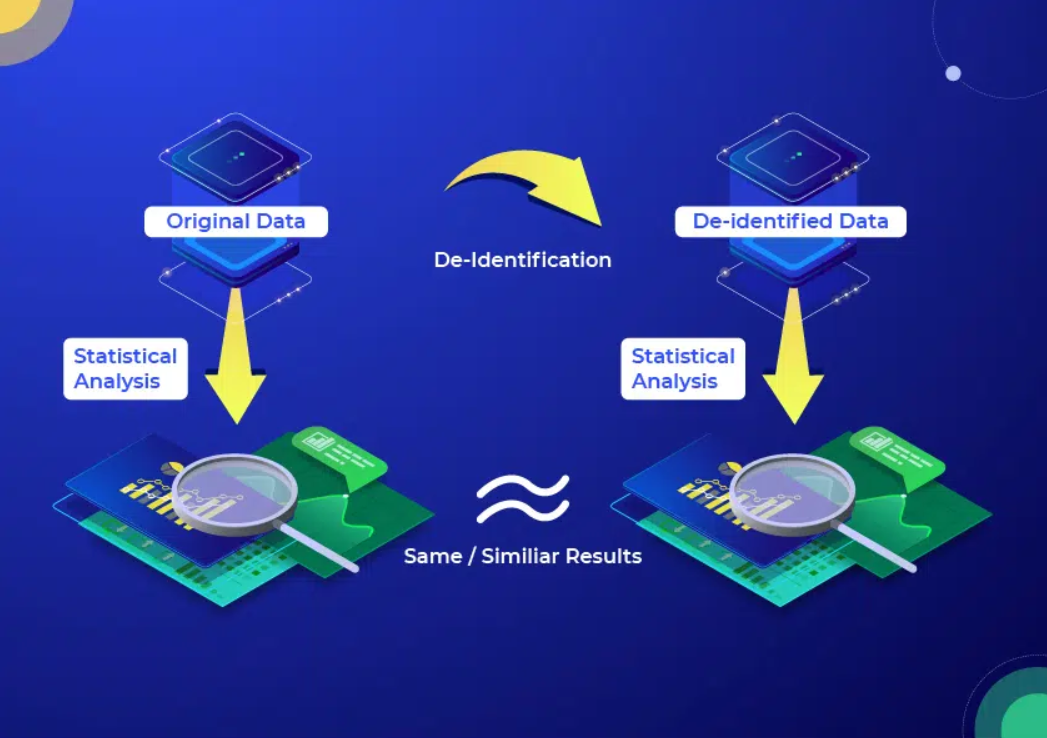The Health Insurance Portability and Accountability Act of 1996 (“HIPAA”) protects the privacy of patients and sets forth guidelines on how this private health information can be shared. Though the privacy of a patient must be protected, the legal right of a business to sell health information of patients has been upheld by the Supreme Court of the United States.

¶ De-identification Methods
Data de-identification is the process of eliminating Personally Identifiable Data (PII) from any document or other media, including an individual’s Protected Health Information (PHI).
¶ Safe Harbor Method of De-identification
The HIPAA Safe Harbor Method is a precise standard for the de-identification of personal health information when disclosed for secondary purposes.
It requires the removal of 18 identifiers from a dataset:
- Names
- All geographical subdivisions smaller than a State, including street address, city, county, precinct, zip code, and their equivalent geocodes, except for the initial three digits of a zip code, if according to the current publicly available data from the Bureau of the Census:
- The geographic unit formed by combining all zip codes with the same three initial digits contains more than 20,000 people
- The initial three digits of a zip code for all such geographic units containing 20,000 or fewer people is changed to 000.
- All elements of dates (except year) for dates directly related to an individual, including birth date, admission date, discharge date, date of death and all ages over 89 and all elements of dates (including year) indicative of such age, except that such ages and elements may be aggregated into a single category of age 90 or older
- Phone numbers
- Fax numbers
- Electronic mail addresses
- Social Security numbers
- Medical record numbers
- Health plan beneficiary numbers
- Account numbers
- Certificate/license numbers
- Vehicle identifiers and serial numbers, including license plate numbers
- Device identifiers and serial numbers
- Web Universal Resource Locators (URLs)
- Internet Protocol (IP) address numbers
- Biometric identifiers, including finger and voiceprints
- Full face photographic images and any comparable images and
- Any other unique identifying number, characteristic, or code (note this does not mean the unique code assigned by the investigator to code the data).
¶ Data De-identification Tools
¶ 1. ARX Data Anonymization Tool
ARX is an open-source tool that anonymizes sensitive personal information. It supports a range of privacy and risk models, techniques for data transformation, and techniques to analyze the utility of output data.
¶ 2. Deid software package
The deid software package includes code and dictionaries that automatically locate and remove PHI in free text from medical records. It was developed using over 2,400 nursing notes that were methodically de-identified by a multi-pass process including various automated methods as well as reviews by multiple experts working autonomously.
¶ 3. Federated Analytics Multiparty Homomorphic Encryption (FAMHE)
Privacy-preserving federated analytics for precision medicine with multiparty homomorphic encryption
Using real-world evidence in biomedical research, an indispensable complement to clinical trials requires access to large quantities of patient data that are typically held separately by multiple healthcare institutions.
We propose FAMHE, a novel federated analytics system that, based on multiparty homomorphic encryption (MHE), enables privacy-preserving analyses of distributed datasets by yielding highly accurate results without revealing any
intermediate data.
We demonstrate the applicability of FAMHE to essential biomedical analysis tasks, including
Kaplan-Meier survival analysis in oncology and genome-wide association studies in medical genetics.
Using the system, we accurately and efficiently reproduce two published centralized studies in a federated setting, enabling biomedical insights that are not possible from individual institutions alone.
Our work represents a necessary key step towards overcoming the privacy hurdle in enabling multi-centric scientific collaborations.
¶ References
- HealthVerity Census - HealthVerity
- Frontiers | A Policy and Practice Review of Consumer Protections and Their Application to Hospital-Sourced Data Aggregation and Analytics by Third-Party Companies | Big Data (frontiersin.org)
- Data De-Identification, Data Minimization Into Snowflake with Baffle
- Use of Medicare Data (qemedicaredata.org)
- Data De-Identification - Satori (satoricyber.com)